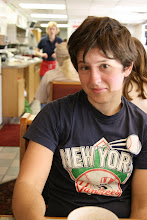
This is an excerpt from Tom Spanbauer's book, Now is the Hour. Main character Rigby John Klusener is 17, Mormon, living on his family farm in Idaho in 1967. He is in love with the farm hand, a Shoshone named George Serrano. George's grandmother, Granny Queep, has just died. The book begins and ends with Rigby John chasing George Serrano to San Francisco. The picture is one I took in Idaho while driving out west 2 1/2 years ago with Zachary, suitable because we didn't yet know the drama that would unfold in our relationship, the lives we would begin on a new and foreign coast, and having shared and our high school hometown and handholding in the small city of Ithaca, NY.
Back at Granny's house, the giveaway was just that. Every pot and pan of Granny's, her coffeepot, the pewter cups, every stick of furniture-- her bed, her box spring and mattress, her sheets, her pillows, her table and chairs, her sewing machine, the picture of the flowers, the armoire, all the linens and blankets in the armoire, Granny's tunk, all the Pendleton blankets in the trunk. Bonanza's Pendleton blanket. The kerosene lamp. Granny's new refirdgerator. Her green enamel Majestic stove. The curtains on the windows, the curtains under the counter of the sink. George's bed, his dresser, the round mirror on his wall. The blue glass ashtray.
The chickens, the eggs, Granny's two bales of straw, the porcelain pans hanging in the barn.Everything. Even the two lightbulbs.
The tipi was dismantled, the canvas rolled up, the poles stacked onto a pickup, hauled away.
As people left, taking with them Granny's worldly goods, George stood where the tipi had set, next to the smoldering fire. In his hands, a big roll of dollar bills. He peeled off a dollar bill for every person. George saved the last dollar bill for me.
By sunset it was just me and George in Granny's empty house. The light through the windows on the shiny floor. The places where her pictures had hung. The stovepipe, crooked, hanging down. The scrapes on the floor where the table and chairs had sat. The four dents that had been her bed.
George walked through the rooms, close to the walls. He touched everything he could. When he got to the electrical box next to the front door, George opened the metal door, reached in, and unscrewed the fuse. He put the fuse in his pocket, then closed the metal door.
Then out of nowhere.
Would you get the broom for me? George said.
The broom? I said. There's nothing left.
It's in the back of your pickup, George said.
In the back of the pickup, an old broom, its bristles worn down to a fist. And a suitcase. One of those old kinds of suitcases, leather, that look like a valise.
George swept the house, every corner. The little pile of dust he swept up, we picked up with our hands. Carried the dust out to the smoldering fire, threw the dust onto the fire.
We made sure all the doors and windows were open. In the middle of Granny's room, George took my hand. His hands weren't shaking. George in his Italian suit, his white shirt, his Italian shoes, and cotton socks, the red tie tied around his bristly head.
I took my porkpie hat off. Adjusted my red tie. My hair was bristly too. My Sunday shoes were scuffed, my suit pants were bagging out, the suit jacket wrinkled, the burned iron spot on the collar of my white shirt. Underneath, my crusty shorts and a three- or four-day-old T-shirt. I was ripe all right, but not the worse for wear.
The Shoshone prayer from George's lips was soft and high and sounded like Idaho. Silver and gold in the sunlight, wind in the poplars a high sigh and scratch, dry June grass. Heat lightning storms in the night sky. Pickup trucks backing up and a pine box bumping down into a grave.

No comments:
Post a Comment